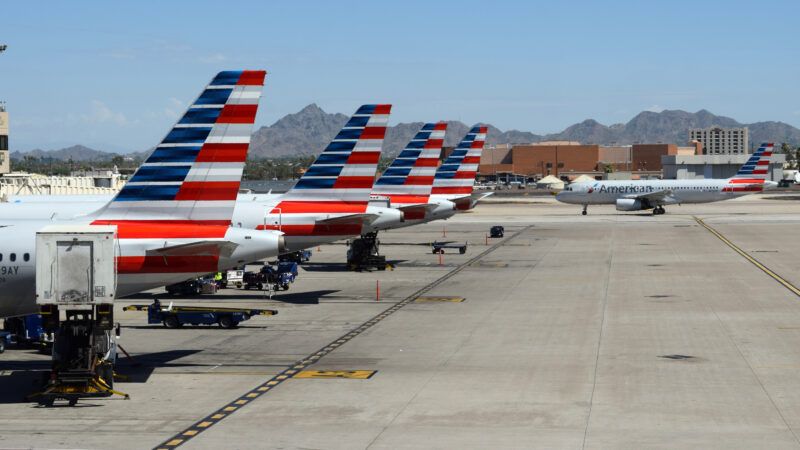Senate Democrats Say Modernizing Airline Pilot Training Requirements Will Kill People
If a proposal to let pilots do more of their training on flight simulators passes, supporters will have "blood on your hands," says Sen. Tammy Duckworth.

Republicans in Congress are trying to slightly pare back America's uniquely high flight-hour requirements for pilots, over the objections of some Democrats and unionized pilots who argue it'll see commercial airliners falling from the sky.
Working its way through both the Senate and House right now is legislation that would reauthorize the Federal Aviation Administration (FAA) for the next five years. Included in the House's reauthorization bill is a provision that would let aspiring airline pilots count up to 250 hours of simulator time toward the 1,500 flight hours they need to get certified. Currently, they can only count 100 simulated hours toward that requirement.
The 1,500-hour requirement is a relatively new one. It was enacted by Congress in the wake of the 2009 Colgan Air crash in upstate New York that killed 50 people and was partially blamed on pilot error. The previous requirement had been 250 hours of flight time.
That's a big increase that's out of step with what most other countries require.
"Looking internationally, there's no comparison. The U.S. is the exception in its really high watermark for pilot training," says Marc Scribner, a transportation researcher at the Reason Foundation (which publishes this website).
Safety regulators haven't found any relationship between the hour cap and safety. Airlines say the 1,500-hour rule is contributing to a worsening pilot shortage.
Buoyed by those arguments, the House managed to pass its FAA bill out of committee this week.
But when Sens. Kyrsten Sinema (I–Ariz.) and John Thune (R–S.D.) tried to include changes to the 1,500-hour cap in the Senate's FAA legislation, all hell broke loose. A hearing where the FAA bill was going to be marked up was canceled. Opponents of the change started accusing supporters of trying to kill people.
"Now is not the time to put corporate profits ahead of the lives of our constituents who may want to board a commercial flight in the future," said Sen. Tammy Duckworth (D–Ill.), per Politico, saying that supporters of changes to the 1,500-hour rule would have "blood on your hands."
The Air Line Pilots Association (ALPA), the pilot's union, has likewise argued in a Thursday letter that the existing rule should remain in place, citing the near disappearance of airline fatalities since the Cogan crash.
More sober assessors suggest the modest changes in the House bill will enhance pilot performance, not weaken it.
Critics note that the Colgan pilots both had over 1,500 hours of experience. Some say the current hours requirement can be counterproductive when it comes to improving pilot performance.
"Simulators allow pilots to train on platforms that they're intended to fly on in circumstances you can't replicate live," says Dan Stohr of the National Air Carrier Association, like inclement weather. "That's better training than toeing a banner over a beach on a sunny day."
Neither the FAA nor the National Transportation Safety Board, the independent agency that investigates transportation accidents, has found any evidence that requiring 1,500 hours of flight time improves aviation safety, notes Gary Leff at the aviation blog View From the Wing.
After accumulating their requisite 1,500 hours, newly certified airline pilots often have to go through extensive retraining at airline flight schools, says Stohr. Regional airline advocates have said in congressional testimony that high flight-hour requirements have contributed to service cuts across hundreds of small airports and hundreds of airliners sitting idle.
Fully repealing the 1,500-hour rule is a political non-starter. Individual airlines' efforts to get the FAA to unilaterally count training hours completed at their own flight training programs toward the 1,500-hour cap have also come to naught.
The hope was that modest reforms could win support as part of the must-pass FAA reauthorization. Its current authorization expires at the end of September.
But reform is proving to be a tougher lift.
Rent Free is a weekly newsletter from Christian Britschgi on urbanism and the fight for less regulation, more housing, more property rights, and more freedom in America's cities.


Show Comments (32)